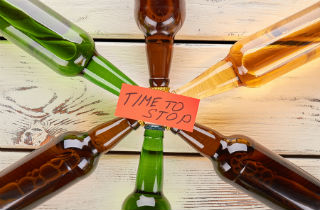Hangovers suck.
And most of us have heard that to cure a hangover, all you need to do is start drinking again. While this may increase your blood alcohol concentration (BAC) and delay the symptoms of a hangover, what does drinking after drinking do to your body? Does it work? And does drinking alcohol to cure the hair of the dog mean that you’re an alcoholic? We present the three most common and accepted theories for the hair of the dog here.
Theory 1: Drinking during a hangover prevents metabolism of methanol.
In this theory, one of the biological causes of hangover includes methanol. Methanol is a compound present in some darker alcoholic beverages (rum, red wine, brandy and whiskey) that is created during fermentation. Research has found that methanol can contribute to the severity of a hangover. Both the ethanol found in alcohol and the methanol present during the duration of a hangover are metabolized by alcohol dehydrogenase. The theory goes that because ethanol is a much better substrate for this enzyme, drinking more ethanol effectively prevents (or delays) the metabolism of methanol. Even if it’s not a cure, drinking can put off the symptoms of a hangover for at least a while.
Theory 2: Drinking more alcohol during a hangover increases blood sugar levels.
Another possible cause of hangover is low blood sugar levels (in combination with other factors). This theory takes into account sugar metabolism and posits that drinking more alcohol can cause a blood sugar spike. In other words, as you take in more calories, these convert to ‘sugar’ and raise the body’s blood sugar, affecting related symptoms of a hangover such as headaches or lightheadedness.
Theory 3: Drinking alcohol during a hangover is a sign of alcohol dependence.
Typically, a hangover begins within several hours after you stop drinking alcohol when blood alcohol concentration (BAC) falls. Symptoms of a hangover peak when BAC is zero and continue for 8-24 hours later. However, overlap exists between hangover and the symptoms of mild alcohol withdrawal. So how can you know the difference between a regular hangover and mild alcohol withdrawal, which indicates physical dependence on alcohol?
1. A hangover may be a sign of alcohol dependence if you drink excessively over time.
2. A hangover may be a sign of alcohol dependence if it lasts more than 24 hours.
3. A hangover may be a sign of alcohol dependence if accompanied by hallucinations and seizures.
If your body needs more alcohol to function normally, you may not be going through a routine hangover. And if you think that you may be physically dependent on alcohol … there is help. Alcohol dependence is treated with a period of detoxification and then a combination of physical and psychological therapies. Alcoholism rehab may be one option, but there are other ways you can stop drinking. If you are ready to stop, there is help. Feel free to ask us questions here (or email us) and we’ll do our best to find you local resources to help you stop drinking.
Hair of the dog: Should you drink more to help a hangover?
Well, it seems like drinking alcohol for a hangover couldn’t hurt, right? Unfortunately, experts think that re-administration of alcohol during a hangover — the “hair of the dog that bit you” remedy — should be avoided. Further alcohol intake after a drinking binge will only enhance the existing toxicity of alcohol consumed previously and and may increase the likelihood of even further drinking. Neither are healthy for you. But, in the end, you’ll have to experience that for yourself.
Comments? Questions? Feedback? Throw em’ at us. We’re happy to respond personally.









Related Posts